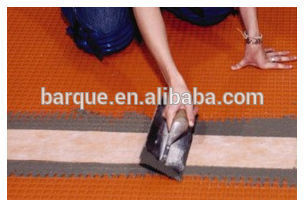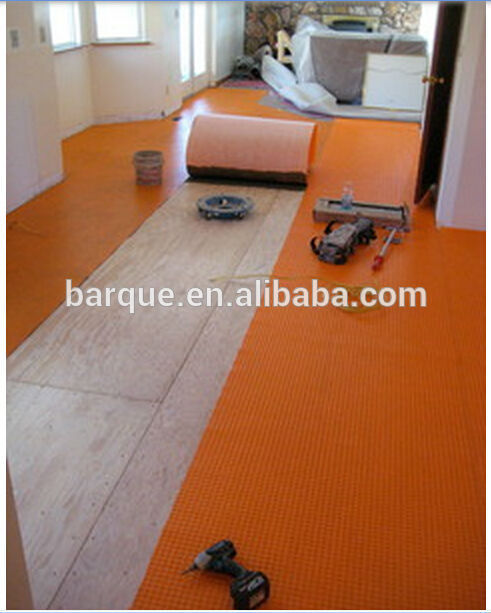Welcome to view our website and enter into business relationship with us.Your feedback will be highly appreciated ! ! !
Tile has been successfully installed for thousands of years by incorporating an uncoupling layer, or forgiving shear interface, within the tile assembly. UNCOUPLING MEMBRANE provides uncoupling through its open rib structure, which allows for in-plane movement that effectively neutralizes the differential movement stresses between the substrate and the tile, thus eliminating the major cause of cracking and delaminating of the tiled surface.
b) Waterproofing
UNCOUPLING MEMBRANE provides reliable waterproofing in interior and exterior applications. Its polyethylene composition protects the substrate from moisture penetration, which is particularly important in today's building environment where most substrates are moisture sensitive.
c) Vapor management
The distinguishing feature of UNCOUPLING MEMBRANE is the existence of free space created by the configured channels on the underside of the matting. The free space provides a route for excess moisture and vapor to escape from the substrate that could otherwise cause damage to the tile layer above. Thus, uncoupling membrane effectively manages moisture beneath the tile covering.
d) Support/load distribution
When placed on a solid foundation, columns or pillars can support tremendous loads. The same physical principle applies to UNCOUPLING MEMBRANE installations. Column like mortar structures are formed in the cutback cavities of the matting. Loads are transferred from the tile covering through these column-like mortar structures to the substrate. Since uncoupling membrane is virtually incompressible within the tile assembly, the advantages of uncoupling are achieved without sacrificing point load distribution capabilities. The ability of uncoupling membrane installations to support and distribute heavy loads while preserving the integrity of the tiled surface has been verified through extensive laboratory and field testing, including applications exposed to vehicular traffic.
a) Uncoupling
Tile has been successfully installed for thousands of years by incorporating an uncoupling layer, or forgiving shear interface, within the tile assembly. UNCOUPLING MEMBRANE provides uncoupling through its open rib structure, which allows for in-plane movement that effectively neutralizes the differential movement stresses between the substrate and the tile, thus eliminating the major cause of cracking and delaminating of the tiled surface.
b) Waterproofing
UNCOUPLING MEMBRANE provides reliable waterproofing in interior and exterior applications. Its polyethylene composition protects the substrate from moisture penetration, which is particularly important in today's building environment where most substrates are moisture sensitive.
c) Vapor management
The distinguishing feature of UNCOUPLING MEMBRANE is the existence of free space created by the configured channels on the underside of the matting. The free space provides a route for excess moisture and vapor to escape from the substrate that could otherwise cause damage to the tile layer above. Thus, uncoupling membrane effectively manages moisture beneath the tile covering.
d) Support/load distribution
When placed on a solid foundation, columns or pillars can support tremendous loads. The same physical principle applies to UNCOUPLING MEMBRANE installations. Column like mortar structures are formed in the cutback cavities of the matting. Loads are transferred from the tile covering through these column-like mortar structures to the substrate. Since uncoupling membrane is virtually incompressible within the tile assembly, the advantages of uncoupling are achieved without sacrificing point load distribution capabilities. The ability of uncoupling membrane installations to support and distribute heavy loads while preserving the integrity of the tiled surface has been verified through extensive laboratory and field testing, including applications exposed to vehicular traffic.

